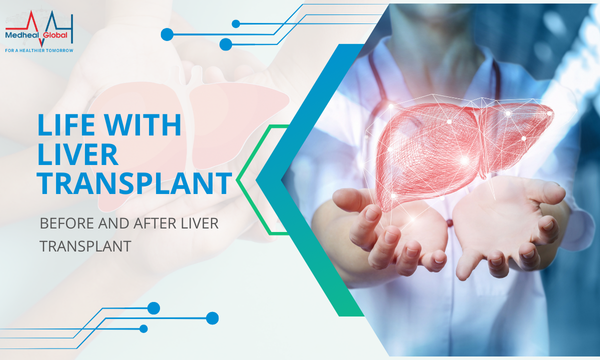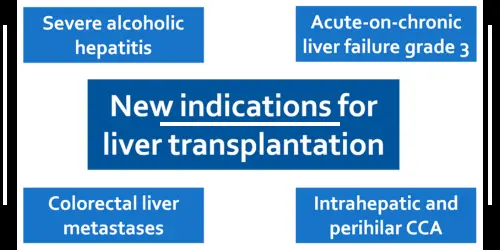Free Consultation - Talk to Our Expert
Before and After Liver Transplant: A Comprehensive Guide

The liver plays a crucial and multifaceted role in the body, responsible for performing a wide range of essential functions, including detoxification, metabolism, and the production of bile juice and vital proteins. These functions are critical to maintaining overall health and well-being. However, damage to the liver, whether due to injury or disease, can lead to liver failure, a potentially life-threatening condition. In such critical situations, a liver transplant in India can serve as a lifesaving intervention, offering a second chance at life. The liver transplant procedure involves replacing the damaged liver with a healthy one, restoring the body's ability to perform these vital functions and ensuring the individual's survival.
Before and After Liver Transplant
Below are particular stages before and after liver transplant:
Before Liver Transplant Procedure
Before undergoing a liver transplant, he goes through evaluations like medical history, lab tests, physical examination, and many imaging studies to study their overall health and the functioning of the liver. If the patient is eligible, he is added to the liver transplant waiting list, which is classified based on the Model for End-Stage Liver Disease (MELD). Many patients before going to the liver transplant list, receive treatment to control their symptoms like ascites, variceal bleeding, and encephalopathy.
After Liver Treatment Procedure:
The liver transplant surgery involves the removal of a failing liver with a healthy liver. After the surgery, patients are monitored in the ICU for 2-3 days post-surgery. Patients spend a few weeks after the surgery recovering and receiving medicines to prevent liver rejection and they gain strength to return to their normal activities over months. Patients are called for regular check-ups with the surgeon to monitor liver functions, change medications, or detect any complications. Patients may require ongoing medical care to manage the complications like rejection, disease recurrence, or infection.
Note: This entire process is the basic procedure. You should always consult the doctor or the surgeon before the liver transplant.
What is Liver Transplant Cost in India?
A liver transplant cost in India is much more affordable than other countries, which makes India a great option for liver transplant surgery. A liver Transplant is the cure for liver failure as no machine is reliable to perform all the functions of the liver.
It is worth noting that the liver transplant cost in India is notably more affordable than many other developed countries and it may vary between 22000 USD to 45000 USD (1900000 INR to 3800000 INR). the Liver Transplant cost in India can get affect by various factors such location, doctors fees, post surgery care, and many more.
What is a Liver Transplant?
It is a surgery where a non-functioning liver is replaced with a healthy liver from either a deceased donor or with a potion of healthy liver from a living donor. The liver is the largest internal organ as it performs many critical functions of the body. Liver Transplant in India is an option for patients with either lung cancer or liver failure where treatment is not working anymore. There are fewer donors available than people who need a liver.
Is Liver Transplant Possible in India ?
Many patients ask if a liver transplant is possible, for which the answer is yes. A liver Transplant is a reliable option for people with chronic liver disease, liver failure, or liver cancer. It is a surgical procedure where a failing liver is either replaced with a healthy liver or a portion of the healthy liver of a living donor. It is one of the most common treatments or surgery for liver disease patients in India.
The liver restores or grows to its natural size shortly after the surgical removal of part of the organ of the living liver donor. With liver transplant cost in India so affordable and medical advancements, the success rate for liver transplants is above 90%. The surgery might take 6 to 12 hours with aftercare in the hospital for one to two weeks.
What are Liver Transplant criteria in India?
The demand for Liver transplant in India is increasing rapidly with a long waiting list for donors. Patients who receive a healthy liver show impeccable results after the surgery as doctors do everything and anything they can do to ensure that the liver transplant surgery is performed carefully and successfully. However, there are some criteria for patients to qualify for liver transplants. The few liver transplant criteria may include:
- There are clinical signs of chronic liver or liver cancer.
- You are healthy enough to have surgery and full recovery.
- No consideration of the risk of alcohol or drug abuse in the future.
Firstly, Doctors or surgeons evaluate the patient’s health and the history of any chemical reliance. If any of these conditions are found, they will be treated first. When you meet the minimum liver transplant criteria, then the patient will be placed on the national waiting list for a liver transplant.
Some Indications for Liver Transplant

A liver transplant is usually considered when the liver of a patient is no longer working efficiently. Liver transplantation shows indications in children or adults who suffer from liver dysfunction, the effects of liver failure, or, in some cases, liver cancer. The most common indications for a liver transplant might include:
- Advanced or Deteriorated cirrhosis means having ascites, bleeding, or jaundice.
- Acute liver Failure.
- Inborn metabolic conditions may include cystic fibrosis or familial amyloid polyneuropathy.
- Hepatic neoplasms.
- Acute hepatic failure or coagulopathy.
- Hypoplasia.
- Sclerosing cholangitis.
Note: these are some of the few common indications for liver transplant. There might be more indications that you can know from the surgeons or doctors in detail.
What is the Life Expectancy after Liver Transplant
The chances of a successful liver transplant and life expectancy are quite promising depending on the situation. The patients who receive a liver transplant may live for up to 10 to 20 years or more after the liver transplant. Patients who receive a liver from a living donor may have better short-term results than those who receive a liver from a deceased donor because the living donor is usually not sick and has a short wait.
Conclusion
A liver transplant is considered a life-saving procedure as it offers a second chance for patients suffering from lung failure or chronic lung disease. The journey of liver transplant is long and challenging but it comes with boundless rewards. India recently emerged as an attractive spot for liver transplants with excellent medical care. The liver transplant cost in India is more affordable in India compared to other developed countries. India’s renowned hospitals and skilled surgeons have increased the life expectancy rate after liver transplants in patients. Medheal Global Care provides information about the transplant and helps you with your treatment in India. We provide 24/7 personalized care, medical visas, doctor consultations, local transportation, and traveling assistance.
